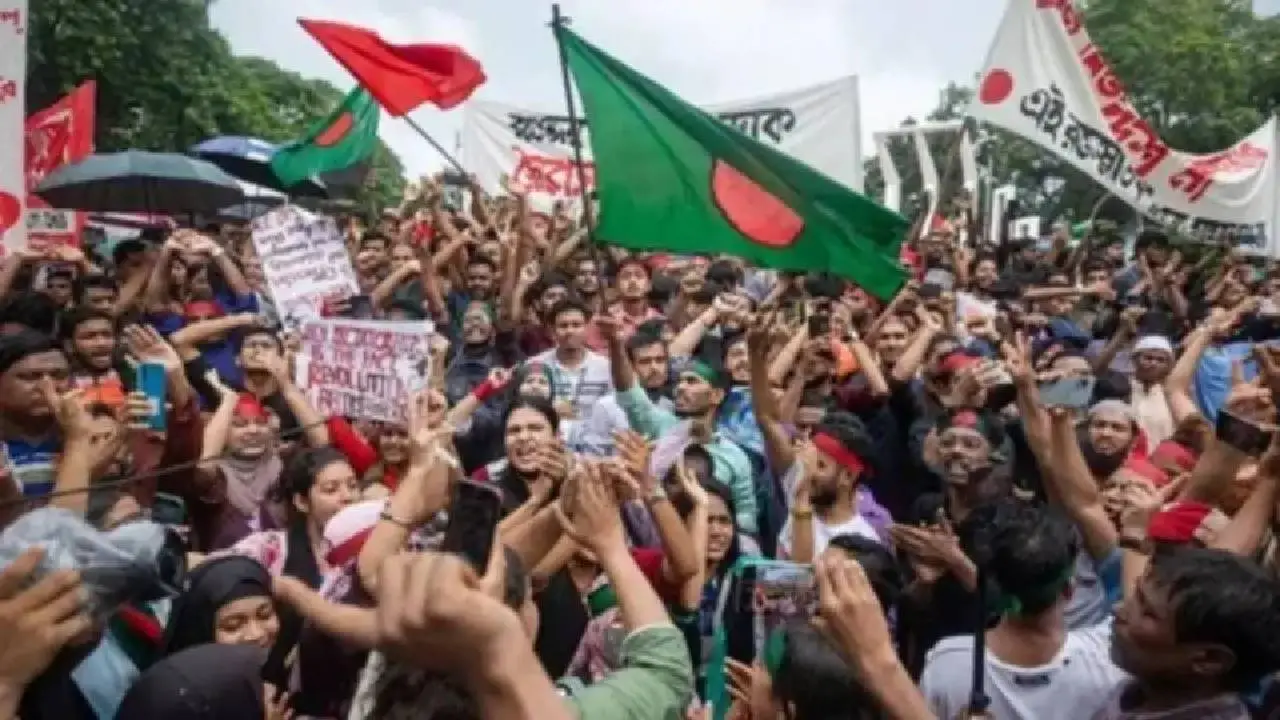
The capital city of Dhaka (Credit:Top Indian News)
National News: The capital city of Dhaka turned into a battleground as protesters clashed with police over the new charter introduced by the interim government of Muhammad Yunus. Demonstrators gathered near Parliament to reject the July charter, which they claim ignores their demands. Tear gas and stun grenades were used by the police to disperse the angry crowd. When this failed, authorities resorted to baton charges. The situation escalated quickly, leaving several injured and deepening the atmosphere of political tension.
Angry protesters argued that the charter fails to recognize victims of past demonstrations, especially those injured during the August 2024 clashes. They demanded rehabilitation and legal protection as part of the new political framework. Hundreds scaled the gates of Parliament, chanting anti-government slogans. Some torched a temporary police control room and damaged official vehicles. Their message was clear: without addressing the pain of ordinary people, the new charter holds no legitimacy in the eyes of the public.
The National Citizens Party (NCP), once considered an ally of Muhammad Yunus, has also rejected the charter. NCP Chief Coordinator Hasnat Abdullah declared the refusal through social media, sparking further debate. Party convenor Nahid Islam accused several political groups of misleading the public by pretending to show unity. Their rejection is a major blow to the interim government, which hoped to present the charter as a consensus plan. Instead, the decision has exposed cracks in the ruling alliance itself.
Adding to the unrest, the country’s largest opposition party, the Awami League, has been sidelined from the political process. Most of its senior leaders face trial or imprisonment under the interim government’s orders. With many leaders absconding, the party was neither invited to dialogue nor allowed to participate in drafting the charter. The absence of the Awami League leaves the process incomplete, as millions of its supporters feel unrepresented in shaping the country’s political roadmap.
For ordinary citizens, the crisis has reopened old wounds. Just a year ago, Bangladesh saw massive protests against Sheikh Hasina’s government, which forced her resignation. People had hoped the Yunus-led interim administration would provide stability. Instead, the same citizens now accuse the government of repeating past mistakes. Roads are blocked, markets shut, and schools disrupted. Families worry about safety as the violent protests bring back memories of last year’s turmoil and bloodshed.
Political observers warn that instability is growing rapidly. Violent clashes in Dhaka signal that frustration is boiling over across the country. Without broad consensus and credible inclusion of all major parties, the interim government’s reforms may collapse. International partners are also watching closely, as Bangladesh plays a key role in South Asian trade and security. The credibility of Yunus as a leader now faces its toughest test, with critics accusing him of betraying public trust.
Experts believe that dialogue is the only path forward. By excluding large sections of society and opposition, the government risks dragging Bangladesh into prolonged chaos. To restore confidence, all parties must come to the table, including the Awami League. A transparent process that addresses victims’ concerns is critical for peace. Until then, the clashes in Dhaka will continue to mirror a country torn between its people’s anger and its leaders’ stubbornness. Bangladesh’s future now depends on reconciliation and compromise.





Copyright © 2026 Top Indian News
